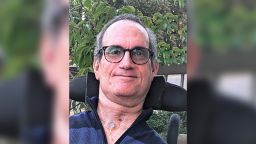Editor’s Note: Ben Mattlin, a Los Angeles-based writer born with spinal muscular atrophy, is the author of several books about disability. His latest, called “Disability Pride,” will be out in November from Beacon Press. The views expressed in this commentary are his own. View more opinion on CNN.
My wheelchair hides my worst disability.
Most people probably think that having spinal muscular atrophy — a neuromuscular weakness I’ve had since birth — is the nastiest thing that ever happened to me. It isn’t. It isn’t even my most irritating, aggravating or vexingly incurable medical problem.
That dubious honor goes to … ulcerative colitis (UC).

My UC is more or less well-managed, thanks to a lot of effort. But its symptoms are maddeningly erratic and unpredictable. It’s considered an autoimmune disease, a still-evolving classification thought to include lupus, rheumatoid arthritis, multiple sclerosis, celiac disease, Graves’ disease, Lyme disease and many more, according to Meghan O’Rourke’s “The Invisible Kingdom.” These and other chronic illnesses disrupt the lives of nearly 200 million Americans, according to the Centers for Disease Control and Prevention — not including another 16 million with long Covid, according to the Brookings Institution.
Such disorders are often considered “invisible” because they’re not apparent to onlookers. But that doesn’t mean they don’t hurt and don’t impact people daily. That’s why, in 2014, the Invisible Disabilities Association designated the third week of October as Invisible Disabilities Week, to help raise awareness and build support for those of us who are coping with complex chronic diseases.
Frankly, when you also have the opposite sort of debility — one that’s highly visible, as I do — it’s easy to forget about or at least minimize other infirmities. That is, until an awful flareup reminds you.
A lot of disabled people like me have multiple conditions, some of which may go undiagnosed. The CDC estimates that more than 38% of disabled American adults are also obese, 16% also have diabetes and 12% also have heart disease.
Many people, even including many in the disability rights movement, often overlook less visible disabilities, including mental illnesses. But they’re just as important — and as stigmatizing.
In fairness, I’ve been complicit in keeping my less obvious malady under wraps. Despite publishing several books and essays about almost every embarrassing detail of my life as a proud disabled person — someone who has learned to love his emaciated arms and legs and crooked spine — I’ve unwittingly neglected to divulge the full extent of my ongoing battle with gut inflammation.
The reasons for this deception seem obvious: First, it’s embarrassing and, second, it’s no one’s business. But perhaps in acknowledging the beast, I can hereby soften its fangs.
After all, ulcerative colitis and other inflammatory bowel ailments such as Crohn’s disease are nothing to be ashamed of. Like all autoimmune diseases, they can be treated but not cured. Doctors offer a number of therapies, including aminosalicylates (pills, suppositories or enemas), antibiotics and steroids. Perhaps the most effective treatments are immunosuppressants, which lower your ability to fight infections, something I really don’t want in the age of Covid.
Surgery only helped me to a degree. Years ago, after a life-threatening colitis-related Clostridioides difficile infection, I had my colon removed. Ever since, I’ve sported a colostomy pouch under my clothes. The little bit of my rectum the surgeon left can still become inflamed, however, and leak odorless mucus that intermittently stains my pants. I have no control over it. Flareups can be excruciatingly painful, too, like a bad cramp that presses against the bladder. And yes, accidents do occur every now and then.
But usually, the only outward sign is a frown on my face, and maybe my grumpy mood. The fact that I’m always sitting helps. No one knows if my pants are soiled. But if I ever have to get out of my chair — at, say, the dentist or to board an airplane — I panic. I envision dying of shame.
In online forums you read about various pseudoscientific remedies — raw kombucha, aloe vera jelly, even belly exercises. Believe me, I’ve tried many of them. But I have doubts about advice from strangers. Which may be another reason I’ve kept my intestinal affliction on the down-low. I don’t want to attract hucksters.
A more honest explanation is that very little of my life is private, so I’ve been protective of the few secrets I have. Anyone who sees me instantly knows a number of big and personal facts about me. For instance, not only can’t I walk, but I clearly need help with all manner of daily activities. Wrongheaded assumptions are common, too, of course — such as, that I can’t make up my own mind at restaurants. But even if I can’t pretend that walking is an option, I can make believe my bowels are fine.
Make no mistake: My spinal muscular atrophy impacts my whole life. But that’s not all there is to me. And when it comes to what can most upend my day and my sense of well-being, there’s no contest. Ulcerative colitis is far more intrusive because it sneaks up on me, and nobody understands when I suddenly wince for no apparent cause.
I only wish more people realized that disabilities come in all types — even if you can’t tell by looking. Learning about invisible disabilities is an important first step in creating a better understanding and, ultimately, building a more inclusive society.

